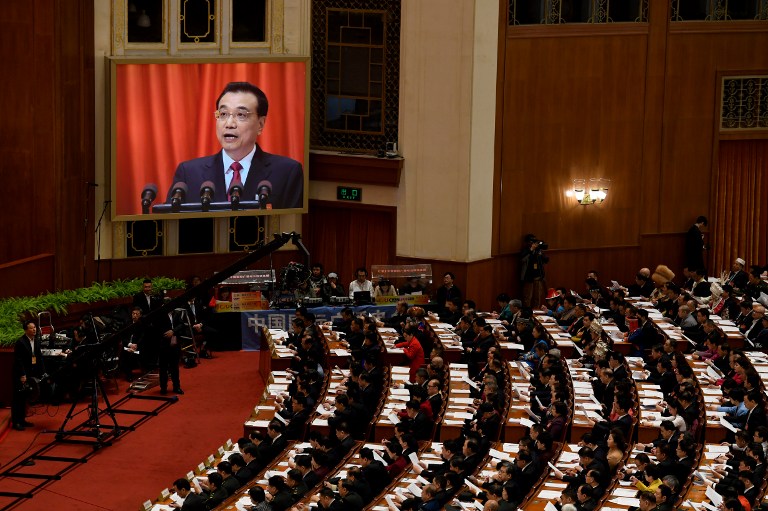China trims GDP target, citing ‘grave challenges’

Chinese Premier Li Keqiang is shown on a screen as he delivers his work report during the opening session of the National People’s Congress, China’s legislature, in Beijing’s Great Hall of the People on March 5, 2017. / AFP PHOTO / GREG BAKER
China’s premier warned Sunday that the world’s second-largest economy faces “grave challenges,” signaling a further deceleration as he announced a trimmed 2017 GDP growth target of “around 6.5 percent.”
China’s economy already is growing at its slowest rate in more than a quarter of a century and the latest goal detailed in an address by Li Keqiang to the country’s rubber-stamp parliament, is lower than a 6.5-7.0 percent range he set last year.
Full-year growth in 2016 came in at 6.7 percent, the weakest since 1990.
“In the past year, China’s development has faced grave challenges posed by a great many problems and interwoven risks and dangers both at home and abroad,” Li said in his address to the National People’s Congress (NPC), the Communist Party-controlled legislature.
China aims this year for “GDP growth of around 6.5 percent, or higher if possible in practice”, he said.
The target came in slightly below analysts’ expectations, indicating that authorities would prioritize controlling an array of economic risks over pushing short-term growth.
The NPC brings together thousands of politicians from across China, touted by the ruling party as proof that it answers to the people despite a monopoly on power, and is used to outline top national priorities and policies.
China is trying to pivot from hyper-fast economic growth based on investment and exports, towards a steadier consumer-driven model.
But the transition is complicated by slowing growth, a slumping currency, massive capital flight by Chinese enterprises seeking better returns abroad, and growing fears of a looming housing bubble and bad-loan crisis.
Li’s report set an inflation target of “around 3 percent” for the year.
Risks and dangers
“2016 was an unusual year in our country’s development,” Li said, citing external challenges such as slow global growth and financial volatility.
Domestically, he cited “major structural problems, prominent risks and dangers, and mounting downward pressure on the economy”.
But he said China “succeeded” in maintaining economic stability.
The growth target remains sufficient to meet the Communist Party’s goal of doubling the size of the economy by 2020, compared to 2010, according to a report by China’s top economic planning agency released in conjunction with the congress’s opening.
“Yet we must not lose sight of the many problems and challenges China faces in pursuing economic and social development,” Li said.
These include the “serious challenge” of industrial overcapacity, differing growth rates across China, and “potential economic and financial risks.”
The premier’s lengthy address touched on a broad range of key national issues, including pledges to maintain the stability of the yuan currency, address severe air pollution and “oppose” protectionism.
Li said China would “resolutely oppose” any moves towards Taiwan independence, a possible coded message to US President Donald Trump.
Trump has signaled support for Taiwan — which Beijing claims as its own — and opposition to the expanding Chinese presence in the South China Sea, though the US rhetoric has softened lately.
China watchers will be looking during the 10-day NPC session for clues on President Xi Jinping’s political ambitions ahead of this autumn’s Communist Party Congress, an event held every five years and which has far greater bearing on politics.
Since taking over in 2012, Xi has consolidated power more rapidly than any leader in decades, but has shaken the party with an anti-graft crackdown and moves to install allies in high posts.
He is expected to unveil a leadership shuffle at the autumn gathering amid speculation it could indicate whether he intends to stay on beyond the traditional 10-year term.
The NPC kicked off with a splash of color as delegates from China’s dozens of ethnic minorities arrive in traditional dress, images meant to reinforce ethnic harmony despite tensions in some regions.
Authorities have shut down various industries to prevent the country’s notorious smog from embarrassing delegates and, as every year, tightened security nationwide.
Much of the session is marked by meeting after meeting of business-suited male delegates affirming pre-approved Communist Party talking points.
It closes with Li’s annual press conference — the only time each year that foreign journalists are allowed to quiz an official in China’s top inner circle, though questions are screened in advance.